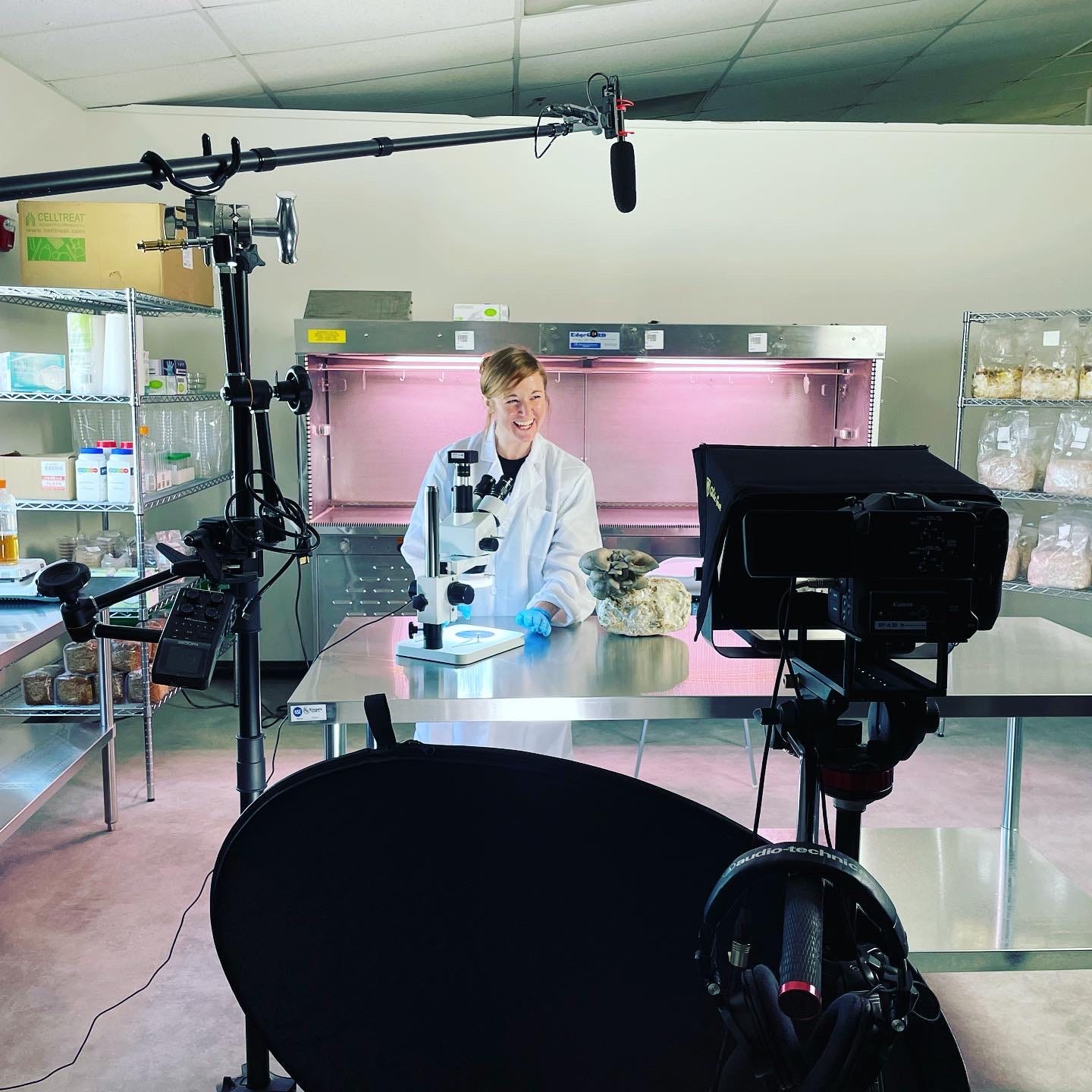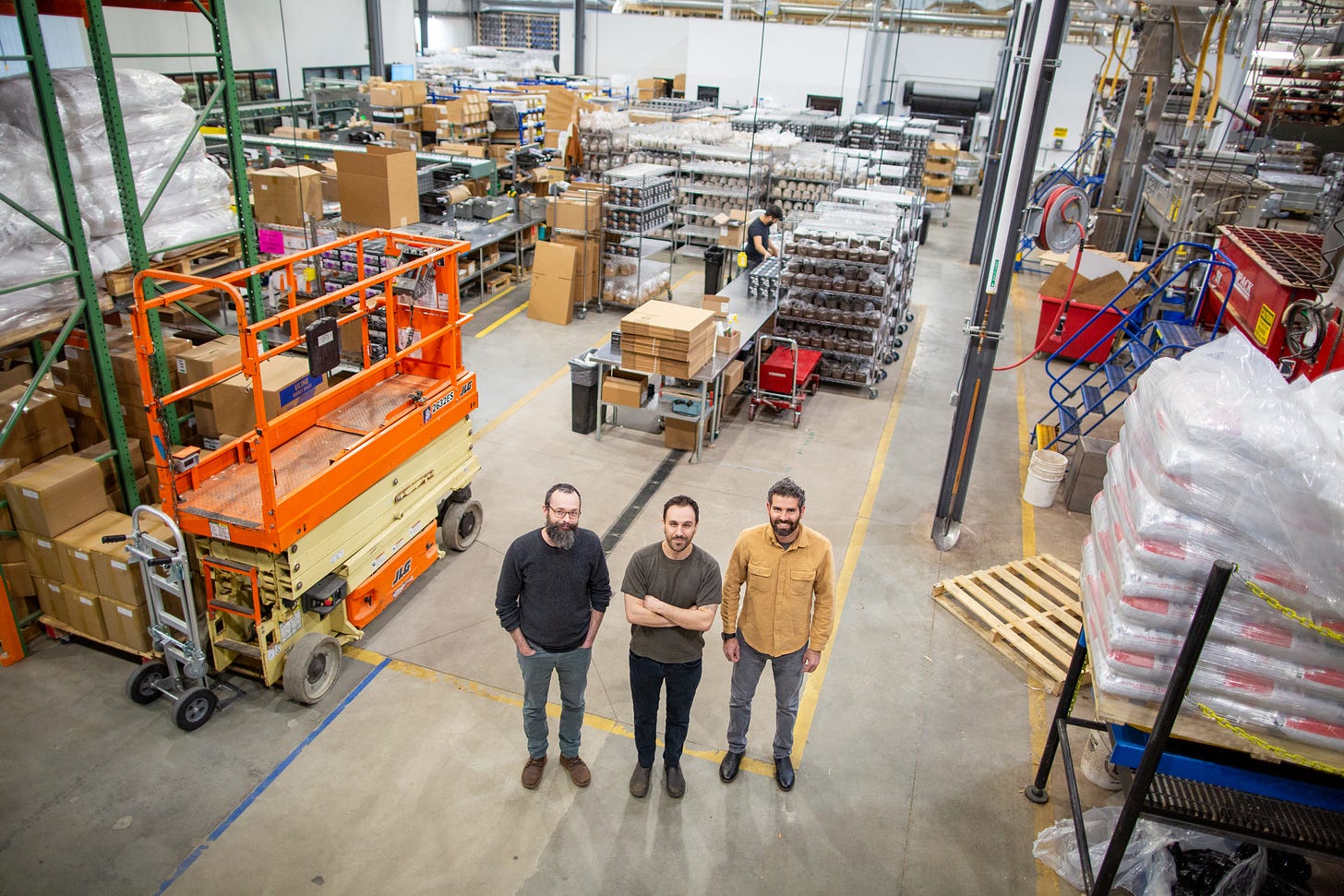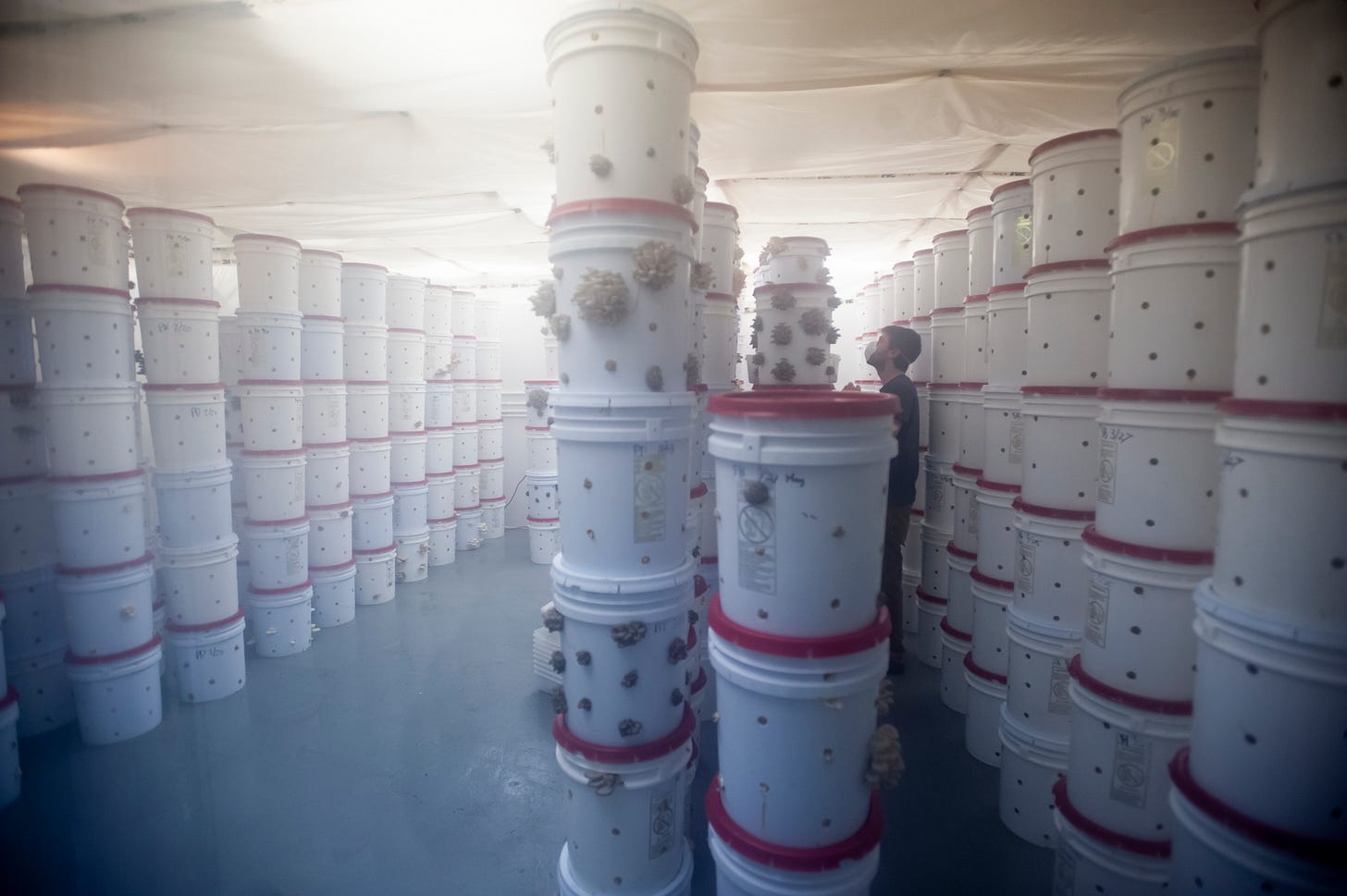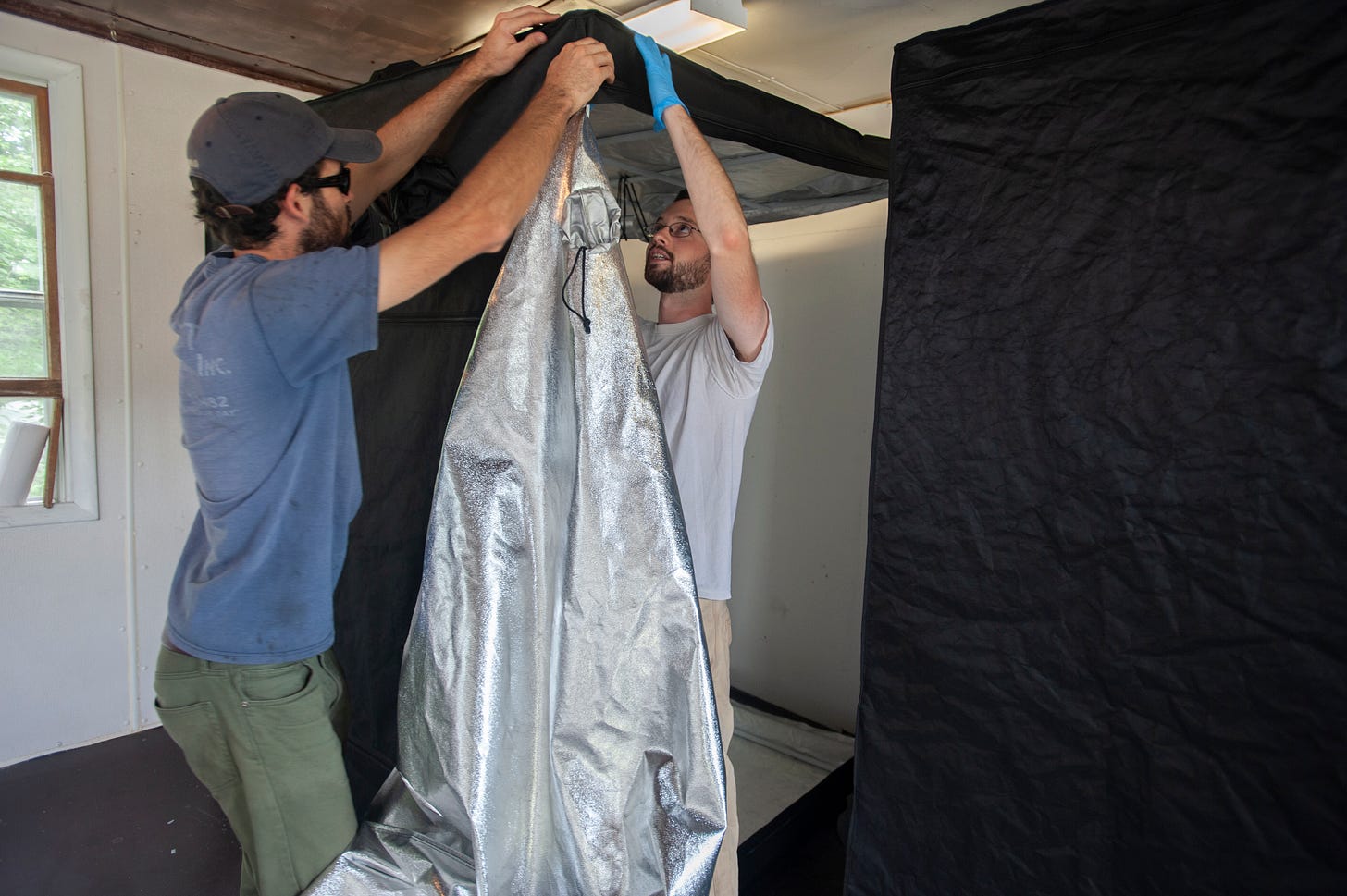A Mushrooming Business
How North Spore grew from a micro-mushroom farm to one of the country's largest mushroom supply companies
Pulling Back the Curtain on North Spore
While reviewing comments on a video release of my recent interview with Hamilton Morris, I came across a familiar criticism of North Spore—the company my two friends and I founded in 2014. The critique, like others in the same vein, goes something like this: North Spore is great, but it’s Big Mushroom—corporate and owned by early investors who poured in a ton of money. The founders left the company a long time ago.
The truth? We don’t have any investors yet. We built this company almost entirely by reinvesting our cash flow back into the business. The three of us who founded North Spore still work out of our facility in Portland, Maine, alongside an incredible team.
Unlike other mushroom businesses that revolve around a larger-than-life figurehead, we deliberately chose not to center North Spore around a cult of personality. We’ve always been fascinated by fungi—growing them, foraging for them, and working with them—but we never wanted to be the stars.
Instead, we set out to empower others to start their own mushroom journeys, spotlight the talented individuals at North Spore, and foster a thriving community of fungi enthusiasts.
That said... it’s time to pull back the curtain and give you a full tour of our “Wonka Factory” of mushrooms.
In this article, I’ll walk you through how North Spore grew from a tiny operation—growing oyster mushrooms in buckets and selling them to local restaurants—into the eight-figure eCommerce mushroom supply company it is today. If you’re thinking about starting your own mushroom business, I hope this gives you some insight and inspiration
The Beginning
As Winnie the Pooh wisely reminds us, “The beginning is a great place to start.”
North Spore was founded by me and two friends, Eliah and Jon, whom I met at the College of the Atlantic in Bar Harbor, Maine. The three of us were like-minded New Englanders with an initial interest in botany, not mycology—but each of us eventually found our way to mushrooms.
As a teen, I loved hunting for mushrooms and identifying them with a pocket field guide. By the time I was nineteen, I was working at a farm-to-table restaurant on Mount Desert Island, where a more experienced prep chef taught me how to identify chanterelles. Similarly, both Jon and Eliah had early exposure to mushroom foraging with their families. Jon took his passion further and earned a graduate degree in mushroom biology from the University of Wisconsin–La Crosse, studying under the late, great Tom Volk.
We decided to start a business over a couple of bottles of wine at a Portland bar in 2013. Mushrooms were the common thread between us, and Jon had already voiced interest in starting a mushroom farm. The idea was born that night, though it would take another year before we got serious about it.
The first step was picking a name—one that would foreshadow the pivot into working with mushroom cultures and growing supplies.
Our brainstorm covered all the usual fungi-related ideas. Maine Mushroom Co.? Portland Mushroom Farm? We quickly decided against geolocating ourselves—what if we moved? We also didn’t want to limit the brand to farming or even mushrooms. Maybe we’d eventually start making yeast strains or brewing?
About an hour in, someone—can’t remember who—suggested the word “spore.” From there, it didn’t take long to land on Northern Spore. But then came the debate:
“What about North Spore?”
“North Spore isn’t grammatically correct—it should be ‘Northern Spore.’”
“Well, we have the North Pole, the North Star... ‘Northern’ sounds too formal. North Spore has a nice ring to it.”
Looking back, I’m grateful we went with North Spore. It sounds like “North Shore”—familiar and approachable. More importantly, it didn’t box us in. It felt expansive, and that expansiveness became core to who we are.
North Spore started as a simple edible mushroom farm, growing a single species using a single technique. Our bread and butter was the humble Blue Oyster mushroom, and our growing system was buckets.
Why buckets? A few reasons:
Blue oysters grow quickly, yield well, and were still relatively novel for restaurants.
Buckets were reusable (as opposed to single-use bags), and space-efficient.
The method allowed for non-sterile environments, using a high-pH water bath to pasteurize straw before inoculating it with grain spawn.
We even made a video about this method that’s still up on YouTube.
Back then, we had a single pressure cooker, a consumer-style flow hood, and our first lab was built inside a stealth cannabis grow tent. Our first facility? A tiny commercial outbuilding with no sink and barely enough space. But at $600/month on Craigslist, it was the cheapest commercial property we could find.
We washed out our buckets using a garden hose outdoors, shredded straw using an antique bale shredder, and soaked our straw in onion sacks in cutoff IBC totes. It was a real bootstrapped mushroom farm. I can still recall the elation of selling our first cluster of blue oyster mushrooms to a local Portland restaurant and making our first $12.
From the start, we chose to be vertically integrated, working with our own cultures and making our own grain spawn in half-gallon mason jars. At the time, most commercial spawn companies catered to button mushroom farms and weren’t interested in serving small-scale growers. Because Jon had an academic background in laboratory mycology and had worked at another spawn company we decided the best move for us was to work with mushroom cultures and make our own grain spawn for our farm.
We quickly saw the opportunity to serve other hobbyists and small farms by selling this high-quality specialty mushroom spawn. That additional product line opened up a whole new revenue stream that would eventually define our business.
We also spent our early years defining North Spore as a brand, even when we were selling a commodity.
One early win was offering restaurant clients a $1/lb discount on mushrooms if they listed “North Spore” on their menus. It worked. Our name became known in the Maine food scene, got us buzz in local news, and helped us scale our fresh mushroom business.
The Pandemic Era
By late 2019, we had outgrown our original space and moved into a larger facility in an old textile mill in Westbrook, Maine. We funded the move with a $25K seed grant from a local business accelerator and kept growing mushrooms in buckets—just with better infrastructure.
We still maintained a strong fresh mushroom arm, brokered wild mushrooms from New England and the Pacific Northwest, and our mushrooms could be found throughout Maine and as far away as Boston, New York, and Seattle. We were expanding throughout the mill’s basement, one quirky space at a time.
This was the era of quickly adding products to our catalogue. New varieties of mushroom spawn, better designed Spray & Grow kits, tinctures, chaga tea, experimentation with instant coffee, pickled mushrooms, and even freshly baked mushroom pastries. If it had to do with mushrooms, we were experimenting with it and experimenting selling our products online.
Marketing our new products was a challenge. Up until then, I handled all the social media, packaging design, and website work. Fortunately, I had a background in photojournalism and knew how to shoot—and had a hunch that video was the future.
I convinced my partners to buy a cheap DSLR that shot video and was compatible with my collection of old camera lenses and started producing tutorials. In December 2019, we launched our first Monotub Tutorial (we’ve since updated it!)—and YouTube quickly became our most important organic marketing channel. Over the next couple of years, we invested heavily in producing our own educational content and product packaging, ultimately building a powerhouse content team.

Then, the pandemic hit.
Mushroom sales to restaurants plummeted as the world ground to a halt. We managed working through the pandemic by forming two separate teams that could operate independently from each other- ensuring that if there was an outbreak in one team, we’d have a backup to help keep things running. We moved to growing fresh mushrooms exclusively for our community farmer’s markets, employees, friends and family. Jon, Eliah, and I chose to pivot hard into growing supplies.
That pivot was terrifying at the time. At the time, we couldn’t anticipate the massive boom in home food production, new hobbies, and gardening. We leaned into product development, launching our now-iconic Boomr Bag and other sterile substrates.
By the end of 2020, we had fully embraced our new direction. Fruit rooms filled with hundreds of pounds of fruiting mushrooms were a thing of the past and we knew we needed to expand again. We’d maxed out our space in the mill and were hauling pallets via a finicky freight elevator, loading up full FedEx trucks by hand, and dealing with crumbling mill infrastructure.

We’d stayed profitable over the years, and saved enough for a down payment on a new facility. That’s when we stumbled on a closed-down trampoline park—complete with office space, loading docks, and land and woodlot for R&D. It felt like destiny.
It took another two years to make it fully operational—but it was worth the wait.
North Spore Today
North Spore in 2025 looks nothing like it did just a few years ago. Our team has grown, and so has our product portfolio.
Our lab is now a state-of-the-art space within our 25,000 sq ft facility—with more air exchanges than an operating theater, and multiple bays dedicated to specialized processes. We have automated equipment for mixing, bagging, storage, and fulfillment. Our team has expanded to more than 60 people- including multiple laboratory technicians, a dedicated quality control team, and a stellar customer service team of people located here in Maine.
We hope this facility is our home for years to come. We’ve got big plans to expand our educational reach (hello, Substack!) and lots of new products in the works.
Drop a note in the chat if you have any questions about our journey—we’re happy to share more!







I would read a book on your journey, perhaps in the future it will come to fruition.
Mittens Bernie was premium tier meme-ing which will live rent friend free in my head for life.